- Home
- W. Somerset Maugham
Collected Short Stories: Volume 1
Collected Short Stories: Volume 1 Read online
Contents
Cover
About the Book
About the Author
Also by W. Somerset Maugham
Title Page
Preface
Rain
The fall of Edward Barnard
Honolulu
The luncheon
The ant and the grasshopper
Home
The pool
Mackintosh
Appearance and reality
The three fat women of Antibes
The facts of life
Gigolo and gigolette
The happy couple
The voice of the turtle
The lion’s skin
The unconquered
The escape
The judgement seat
Mr Know-All
The happy man
The romantic young lady
The point of honour
The poet
The mother
A man from Glasgow
Before the party
Louise
The promise
A string of beads
The yellow streak
Copyright
About the Author
William Somerset Maugham was born in 1874 and lived in Paris until he was ten. He was educated at King’s School, Canterbury, and at Heidelberg University. He spent some time at St. Thomas’ Hospital with the idea of practising medicine, but the success of his first novel, Liza of Lambeth, published in 1897, won him over to letters. Of Human Bondage, the first of his masterpieces, came out in 1915, and with the publication in 1919 of The Moon and Sixpence his reputation as a novelist was established. At the same time his fame as a successful playwright and short story writer was being consolidated with acclaimed productions of various plays and the publication of The Trembling of a Leaf, subtitled Little Stories of the South Sea Islands, in 1921, which was followed by seven more collections. His other works include travel books, essays, criticism and the autobiographical The Summing Up and A Writer’s Notebook.
In 1927 Somerset Maugham settled in the South of France and lived there until his death in 1965.
About the Book
This classic collection of stories moves from England, France and Spain to the silver sands of the South Pacific. It includes the famous story ‘Rain’, the tragedy of a narrow-minded and overzealous missionary and a prostitute, and ‘The Three Fat Women of Antibes,’ an extravagantly sardonic tale of abstention and greed, as well as a host of other brilliant tales.
ALSO BY W. SOMERSET MAUGHAM
Novels
The Moon and Sixpence
Of Human Bondage
The Narrow Corner
The Razor’s Edge
Cakes and Ale
The Merry-Go-Round
The Painted Veil
Catalina
Up at the Villa
Mrs Craddock
The Casuarina Tree
Christmas Holiday
Liza of Lambeth
The Magician
Theatre
Then and Now
Collected Short Stories
Collected Short Stories Vol. 2
Collected Short Stories Vol. 3
Collected Short Stories Vol. 4
Ashenden
Short Stories
Far Eastern Tales
More Far Eastern Tales
Travel Writing
On a Chinese Screen
Don Fernando
Literary Criticism
Ten Novels and their Authors
Points to View
Autobiography
The Summing Up
A Writer’s Notebook
Collected Short Stories Volume 1
W. Somerset Maugham
Preface
THIS IS THE first volume of my collected short stories. In my early youth I wrote a number, but they are so immature that I have preferred not to reprint them. A few are in a book that has long remained out of print, a few others are scattered in various magazines. They are best forgotten. The first of the stories in this collection, Rain, was written in 1920 in Hong Kong, but I had hit upon the idea for it during a journey I took in the South Seas during the winter of 1916. The last of my stories was written in New York in 1945 from a brief note that I found by chance among my papers and which I made as far back as 1901. I do not expect ever to write another.
One of the most difficult things that an author has to deal with when he wants to gather together a quantity of stories into a volume is to decide in what order to place them. It is fairly simple when the stories are of about the same length or are placed in the same local (I should have liked to use the word locale, but the Oxford Dictionary says that this, though commonly used, is erroneous); then the pattern is easy to form. And it is a satisfaction to an author if he can so arrange his material that the book he finally offers to his readers has a pattern, even though they do not notice it. The pattern of a novel is of course plain; it has a beginning, a middle, and an end; and so, for the matter of that, has a well-constructed story.
But my stories are of very different lengths. Some are as short as sixteen hundred words, some are ten times as long, and one is just over twenty thousand. I have sojourned in most parts of the world, and while I was writing stories I could seldom stay anywhere for any length of time without getting the material for one or more tales. I have written tragic stories and I have written humorous ones. It has been an arduous task to get some kind of symmetry and at least the semblance of a pattern into a collection of a large number of stories of such different lengths, placed in so many different countries, and of such different character; and at the same time to make it as easy as possible for the reader to read them. For though to be read is not the motive which impels the author to write, once he has written his desire is to be read, and in order to achieve that, he must do his best to make what he writes readable.
With this intention, where I could I have followed a group of long stories with a group of short ones, sometimes very short, sometimes of five or six thousand words, and so that the reader should not be required to leap suddenly from China to Peru and back again, I have grouped, as well as I conveniently could, stories of which the local (or locale) was in one particular country. In that way I hoped to give the reader a chance to take his bearings in whatever distant land I chose to lead him to.
Rain
IT WAS NEARLY bed-time and when they awoke next morning land would be in sight. Dr Macphail lit his pipe and, leaning over the rail, searched the heavens for the Southern Cross. After two years at the front and a wound that had taken longer to heal than it should, he was glad to settle down quietly at Apia for twelve months at least, and he felt already better for the journey. Since some of the passengers were leaving the ship next day at Pago-Pago they had had a little dance that evening and in his ears hammered still the harsh notes of the mechanical piano. But the deck was quiet at last. A little way off he saw his wife in a long chair talking with the Davidsons, and he strolled over to her. When he sat down under the light and took off his hat you saw that he had very red hair, with a bald patch on the crown, and the red, freckled skin which accompanies red hair; he was a man of forty, thin, with a pinched face, precise and rather pedantic; and he spoke with a Scots accent in a very low, quiet voice.
Between the Macphails and the Davidsons, who were missionaries, there had arisen the intimacy of shipboard, which is due to propinquity rather than to any community of taste. Their chief tie was the disapproval they shared of the men who spent their days and nights in the smoking-room playing poker or bridge and drinking. Mrs Macphail was not a little flattered to think that she and her husband were the o
nly people on board with whom the Davidsons were willing to associate, and even the doctor, shy but no fool, half unconsciously acknowledged the compliment. It was only because he was of an argumentative mind that in their cabin at night he permitted himself to carp.
‘Mrs Davidson was saying she didn’t know how they’d have got through the journey if it hadn’t been for us,’ said Mrs Macphail, as she neatly brushed out her transformation. ‘She said we were really the only people on the ship they cared to know.’
‘I shouldn’t have thought a missionary was such a big bug that he could afford to put on frills.’
‘It’s not frills. I quite understand what she means. It wouldn’t have been very nice for the Davidsons to have to mix with all that rough lot in the smoking-room.’
‘The founder of their religion wasn’t so exclusive,’ said Dr Macphail with a chuckle.
‘I’ve asked you over and over again not to joke about religion,’ answered his wife. ‘I shouldn’t like to have a nature like yours, Alec. You never look for the best in people.’
He gave her a sidelong glance with his pale, blue eyes, but did not reply. After many years of married life he had learned that it was more conducive to peace to leave his wife with the last word. He was undressed before she was, and climbing into the upper bunk he settled down to read himself to sleep.
When he came on deck next morning they were close to land. He looked at it with greedy eyes. There was a thin strip of silver beach rising quickly to hills covered to the top with luxuriant vegetation. The coconut trees, thick and green, came nearly to the water’s edge, and among them you saw the grass houses of the Samoans; and here and there, gleaming white, a little church. Mrs Davidson came and stood beside him. She was dressed in black and wore round her neck a gold chain, from which dangled a small cross. She was a little woman, with brown, dull hair very elaborately arranged, and she had prominent blue eyes behind invisible pince-nez. Her face was long, like a sheep’s, but she gave no impression of foolishness, rather of extreme alertness; she had the quick movements of a bird. The most remarkable thing about her was her voice, high, metallic, and without inflexion; it fell on the ear with a hard monotony, irritating to the nerves like the pitiless clamour of the pneumatic drill.
‘This must seem like home to you,’ said Dr Macphail, with his thin, difficult smile.
‘Ours are low islands, you know, not like these. Coral. These are volcanic. We’ve got another ten days’ journey to reach them.’
‘In these parts that’s almost like being in the next street at home,’ said Dr Macphail facetiously.
‘Well, that’s rather an exaggerated way of putting it, but one does look at distances differently in the South Seas. So far you’re right.’
Dr Macphail sighed faintly.
‘I’m glad we’re not stationed here,’ she went on. ‘They say this is a terribly difficult place to work in. The steamers’ touching makes the people unsettled; and then there’s the naval station; that’s bad for the natives. In our district we don’t have difficulties like that to contend with. There are one or two traders, of course, but we take care to make them behave, and if they don’t we make the place so hot for them they’re glad to go.’
Fixing the glasses on her nose she looked at the green island with a ruthless stare.
‘It’s almost a hopeless task for the missionaries here. I can never be sufficiently thankful to God that we are at least spared that.’
Davidson’s district consisted of a group of islands to the North of Samoa; they were widely separated and he had frequently to go long distances by canoe. At these times his wife remained at their headquarters and managed the mission. Dr Macphail felt his heart sink when he considered the efficiency with which she certainly managed it. She spoke of the depravity of the natives in a voice which nothing could hush, but with a vehemently unctuous horror. Her sense of delicacy was singular. Early in their acquaintance she had said to him:
‘You know, their marriage customs when we first settled in the islands were so shocking that I couldn’t possibly describe them to you. But I’ll tell Mrs Macphail and she’ll tell you.’
Then he had seen his wife and Mrs Davidson, their deck-chairs close together, in earnest conversation for about two hours. As he walked past them backwards and forwards for the sake of exercise, he had heard Mrs Davidson’s agitated whisper, like the distant flow of a mountain torrent, and he saw by his wife’s open mouth and pale face that she was enjoying an alarming experience. At night in their cabin she repeated to him with bated breath all she had heard.
‘Well, what did I say to you?’ cried Mrs Davidson, exultant next morning. ‘Did you ever hear anything more dreadful? You don’t wonder that I couldn’t tell you myself, do you? Even though you are a doctor.’
Mrs Davidson scanned his face. She had a dramatic eagerness to see that she had achieved the desired effect.
‘Can you wonder that when we first went there our hearts sank? You’ll hardly believe me when I tell you it was impossible to find a single good girl in any of the villages.’
She used the word good in a severely technical manner.
‘Mr Davidson and I talked it over, and we made up our minds the first thing to do was to put down the dancing. The natives were crazy about dancing.’
‘I was not averse to it myself when I was a young man,’ said Dr Macphail.
‘I guessed as much when I heard you ask Mrs Macphail to have a turn with you last night. I don’t think there’s any real harm if a man dances with his wife, but I was relieved that she wouldn’t. Under the circumstances I thought it better that we should keep ourselves to ourselves.’
‘Under what circumstances?’
Mrs Davidson gave him a quick look through her pincenez, but did not answer his question.
‘But among white people it’s not quite the same,’ she went on, ‘though I must say I agree with Mr Davidson, who says he can’t understand how a husband can stand by and see his wife in another man’s arms, and as far as I’m concerned I’ve never danced a step since I married. But the native dancing is quite another matter. It’s not only immoral in itself, but it distinctly leads to immorality. However, I’m thankful to God that we stamped it out, and I don’t think I’m wrong in saying that no one has danced in our district for eight years.’
But now they came to the mouth of the harbour and Mrs Macphail joined them. The ship turned sharply and steamed slowly in. It was a great land-locked harbour big enough to hold a fleet of battleships; and all around it rose, high and steep, the green hills. Near the entrance, getting such breeze as blew from the sea, stood the governor’s house in a garden. The Stars and Stripes dangled languidly from a flagstaff. They passed two or three trim bungalows, and a tennis court, and then they came to the quay with its warehouses. Mrs Davidson pointed out the schooner, moored two or three hundred yards from the side, which was to take them to Apia. There was a crowd of eager, noisy, and good-humoured natives come from all parts of the island, some from curiosity, others to barter with the travellers on their way to Sydney; and they brought pineapples and huge bunches of bananas, tapa cloths, necklaces of shells or sharks’ teeth, kava-bowls, and models of war canoes. American sailors, neat and trim, clean-shaven and frank of face, sauntered among them, and there was a little group of officials. While their luggage was being landed the Macphails and Mrs Davidson watched the crowd. Dr Macphail looked at the yaws from which most of the children and the young boys seemed to suffer, disfiguring sores like torpid ulcers, and his professional eyes glistened when he saw for the first time in his experience cases of elephantiasis, men going about with a huge, heavy arm or dragging along a grossly disfigured leg. Men and women wore the lava-lava.
‘It’s a very indecent costume,’ said Mrs Davidson. ‘Mr Davidson thinks it should be prohibited by law. How can you expect people to be moral when they wear nothing but a strip of red cotton round their loins?’
‘It’s suitable enough to the climate,’ said the
doctor, wiping the sweat off his head.
Now that they were on land the heat, though it was so early in the morning, was already oppressive. Closed in by its hills, not a breath of air came in to Pago-Pago.
‘In our islands,’ Mrs Davidson went on in her high-pitched tones, ‘we’ve practically eradicated the lava-lava. A few old men still continue to wear it, but that’s all. The women have all taken to the Mother Hubbard, and the men wear trousers and singlets. At the beginning of our stay Mr Davidson said in one of his reports: the inhabitants of these islands will never be thoroughly Christianized till every boy of more than ten years is made to wear a pair of trousers.’
But Mrs Davidson had given two or three of her birdlike glances at heavy grey clouds that came floating over the mouth of the harbour. A few drops began to fall.
‘We’d better take shelter,’ she said.
They made their way with all the crowd to a great shed of corrugated iron, and the rain began to fall in torrents. They stood there for some time and then were joined by Mr Davidson. He had been polite enough to the Macphails during the journey, but he had not his wife’s sociability, and had spent much of his time reading. He was a silent, rather sullen man, and you felt that his affability was a duty that he imposed upon himself Christianly; he was by nature reserved and even morose. His appearance was singular. He was very tall and thin, with long limbs loosely jointed; hollow cheeks, and curiously high cheek-bones; he had so cadaverous an air that it surprised you to notice how full and sensual were his lips. He wore his hair very long. His dark eyes, set deep in their sockets, were large and tragic; and his hands with their big, long fingers, were finely shaped; they gave him a look of great strength. But the most striking thing about him was the feeling he gave you of suppressed fire. It was impressive and vaguely troubling. He was not a man with whom any intimacy was possible.
He brought now unwelcome news. There was an epidemic of measles, a serious and often fatal disease among the Kanakas, on the island, and a case had developed among the crew of the schooner which was to take them on their journey. The sick man had been brought ashore and put in hospital on the quarantine station, but telegraphic instructions had been sent from Apia to say that the schooner would not be allowed to enter the harbour till it was certain no other member of the crew was affected.

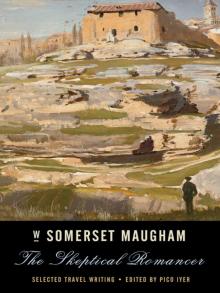 The Skeptical Romancer: Selected Travel Writing
The Skeptical Romancer: Selected Travel Writing The Summing Up
The Summing Up Up at the Villa
Up at the Villa The Razor's Edge
The Razor's Edge The Complete Short Stories of W. Somerset Maugham: East and West (Vol. 1 of 2))
The Complete Short Stories of W. Somerset Maugham: East and West (Vol. 1 of 2))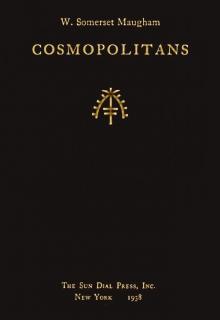 Cosmopolitans
Cosmopolitans 65 Short Stories
65 Short Stories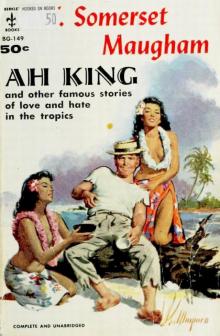 Ah King (Works of W. Somerset Maugham)
Ah King (Works of W. Somerset Maugham) Collected Short Stories: Volume 1
Collected Short Stories: Volume 1 Collected Short Stories Volume 2
Collected Short Stories Volume 2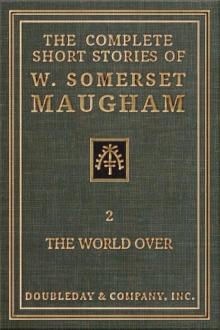 The Complete Short Stories of W. Somerset Maugham - II - The World Over
The Complete Short Stories of W. Somerset Maugham - II - The World Over Collected Short Stories Volume 4
Collected Short Stories Volume 4 Theatre
Theatre Short Stories
Short Stories Then and Now
Then and Now The Favorite Short Stories of W. Somerset Maugham
The Favorite Short Stories of W. Somerset Maugham Of Human Bondage
Of Human Bondage The Magician
The Magician The Great Exotic Novels and Short Stories of Somerset Maugham
The Great Exotic Novels and Short Stories of Somerset Maugham A Writer's Notebook
A Writer's Notebook Christmas Holiday
Christmas Holiday The Making of a Saint
The Making of a Saint Merry Go Round
Merry Go Round The Narrow Corner
The Narrow Corner Collected Short Stories Volume 3
Collected Short Stories Volume 3 Ten Novels and Their Authors
Ten Novels and Their Authors Ashenden
Ashenden The Moon and Sixpence
The Moon and Sixpence Cakes and Ale
Cakes and Ale Liza of Lambeth
Liza of Lambeth The Land of Promise: A Comedy in Four Acts (1922)
The Land of Promise: A Comedy in Four Acts (1922) A Writer's Notebook (Vintage International)
A Writer's Notebook (Vintage International)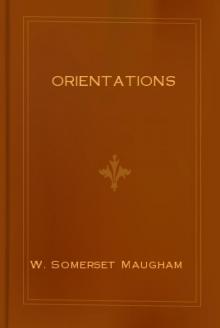 Orientations
Orientations Selected Masterpieces
Selected Masterpieces Mrs Craddock
Mrs Craddock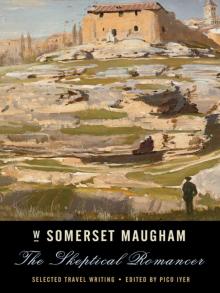 The Skeptical Romancer
The Skeptical Romancer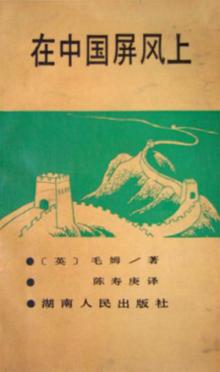 On a Chinese Screen
On a Chinese Screen (1941) Up at the Villa
(1941) Up at the Villa The Great Novels and Short Stories of Somerset Maugham
The Great Novels and Short Stories of Somerset Maugham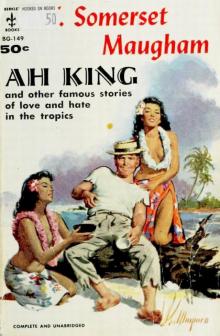 Ah King
Ah King The Explorer
The Explorer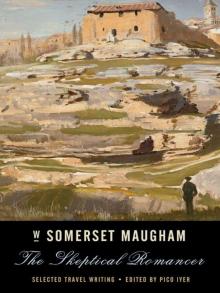 The Skeptical Romancer: Selected Travel Writing (Vintage Departures)
The Skeptical Romancer: Selected Travel Writing (Vintage Departures) The Complete Short Stories of W. Somerset Maugham - I - East and West
The Complete Short Stories of W. Somerset Maugham - I - East and West